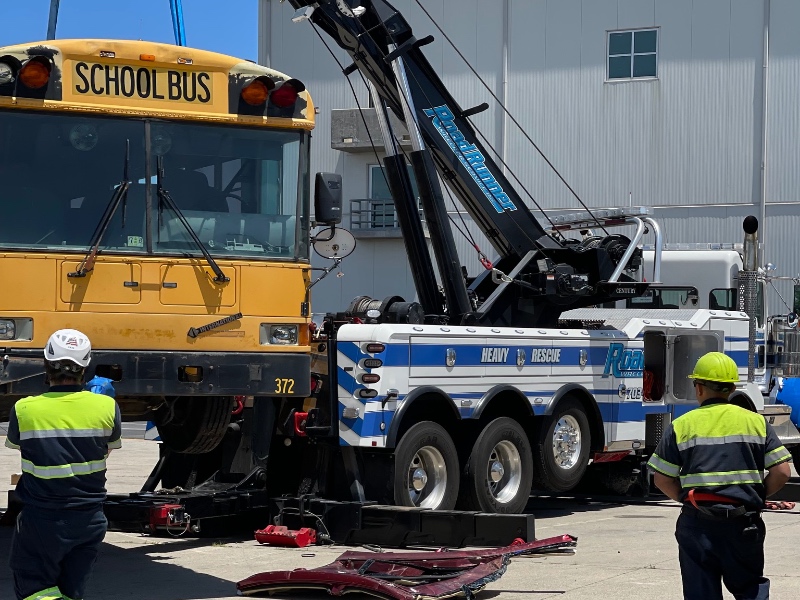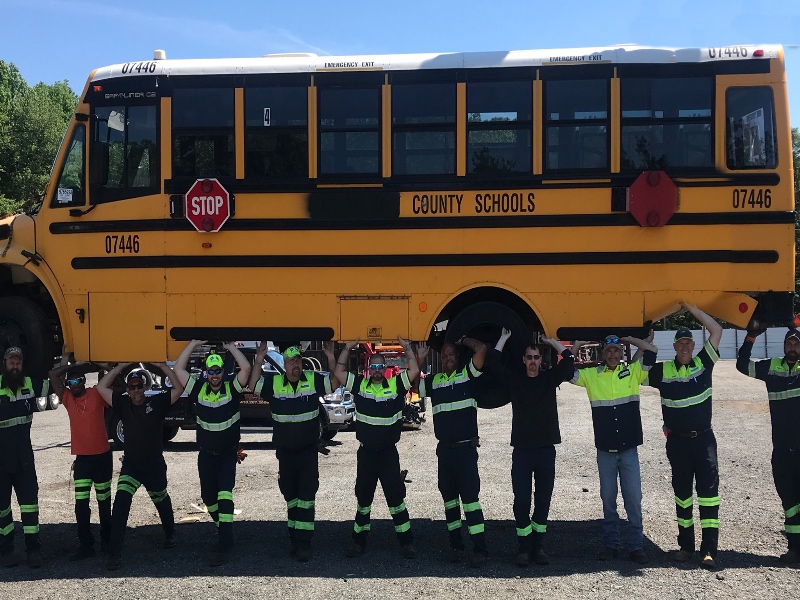More Weight, More Problems
There’s towing, and then there’s bus towing. It’s a different ball game entirely. We’ve handled all kinds of vehicles on the road, but when it comes to Leesburg bus towing, there’s a whole new level of preparation, patience, and precision involved for our tow truck operators. We have to have enough horsepower and the right truck, of course. But we also have to understand the risks, know the vehicle’s limits, and be ready for whatever the road throws at us.

Buses Break Down Too. And It’s Never Subtle
A broken-down bus doesn’t hide. It stops traffic. It blocks intersections. And it leaves dozens of passengers waiting on the shoulder. These aren’t minor inconveniences. When a charter bus overheats in the middle of Route 7 or a school bus stalls during a morning run, the whole situation gets complicated fast.
That’s when people call us for Leesburg bus towing. They know we won’t flinch at the size or urgency of the job.
What Makes Bus Towing So Different?
We don’t approach a bus call the same way we handle a car. Here’s why towing buses is in a league of its own:
Weight That Pushes Limits
A loaded motorcoach or transit bus can tip the scales at over 40,000 pounds. That kind of weight changes everything.
- It affects braking distance.
- It changes how we balance and secure the load.
- It demands a tow truck with serious capacity—and an operator who knows what they’re doing.
Limited Access and Tight Spaces
Most buses don’t break down in convenient places. We’ve pulled stranded school buses out of narrow residential roads and repositioned tour buses blocking hotel entrances.
Leesburg bus towing often means we’re working around:
- Low overpasses and tight turn radii.
- Crowded drop-off areas with no clear pull-through.
- Streets where inches matter between traffic and sidewalks.
We know these challenges because we’ve lived them. That’s how we stay one step ahead.
Unique Hook-Up Points and Safety Risks
Bus designs vary widely. Some have rear engines, low clearances, or special electrical systems that can be damaged during improper hookup.
Our job is to:
- Identify the safest lift points.
- Prevent undercarriage damage during tow prep.
- Avoid disrupting sensitive onboard systems.
That’s not something every tow operator is trained to handle. Leesburg bus towing requires solid experience.
The Right Tools Make All the Difference
For these jobs, we bring out the heavy artillery. Our rotators and heavy-duty wreckers are fitted for big rigs and commercial loads. But tools alone aren’t enough. What counts is how we use them.
Here’s what a bus tow often involves:
- Air ride suspensions that must be managed before lift.
- Drive shaft removal to prevent transmission damage.
- Traffic control setups to protect the recovery zone.
- Constant communication with dispatch and sometimes law enforcement.
Every detail matters. And we’ve learned to treat each one with respect.

Road Runner Wrecker Service Knows Leesburg Bus Towing
We’ve built our reputation on tackling the tough jobs. Leesburg bus towing is no exception. We’ve recovered everything from broken school buses in the suburbs to charter coaches stranded on the Beltway. We know what it takes to move a massive vehicle without turning it into a bigger problem.
If you see one of our trucks backing up to a disabled bus, know this: our Leesburg bus towing crew is ready. We’ve trained for this, we’ve geared up for this, and we’ve got a crew that understands the weight of the responsibility. Literally.
So when a bus breaks down and you need someone who won’t hesitate, remember that towing big doesn’t scare us. We tow buses because we can. And we do it right.
